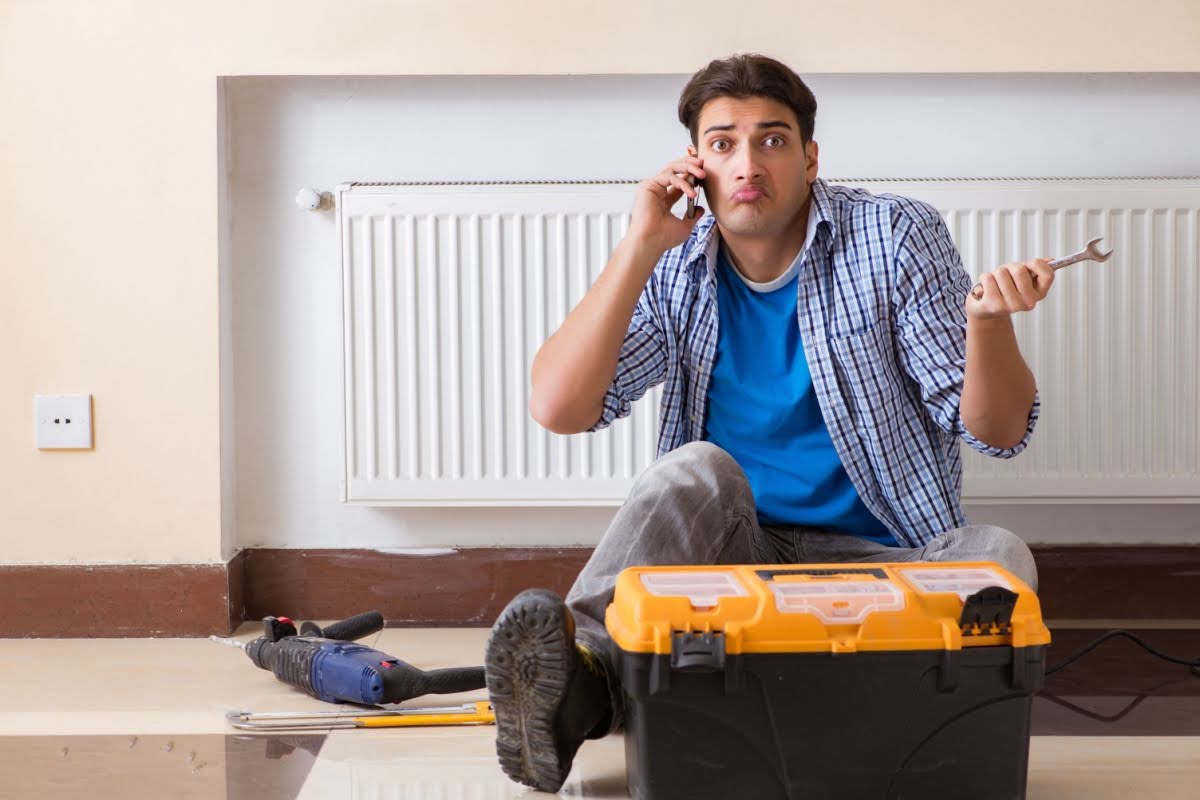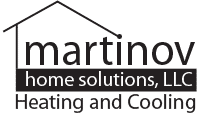July 18, 2025
Categories: General HVAC
The internet offers a vast world of information, with videos and articles suggesting that nearly any home improvement project is a manageable do-it-yourself task. While jobs like changing a lightbulb or painting a room can be handled by yourself, attempting your own HVAC system repairs presents a significant risk. Your heating, ventilation, and air conditioning system is a complex network of electrical components, chemicals, and mechanical parts that requires specialized knowledge and tools for safe handling.
Undertaking air conditioning repairs or tinkering with your furnace without proper training can lead to serious consequences, including personal injury, expensive damage to your equipment, and even putting your family’s health in jeopardy. Martinov Home Solutions is here to explain the serious dangers associated with DIY HVAC repairs and why calling a professional technician is always the wisest choice for your home and your peace of mind.
Give us a call with any questions or to book an appointment! We provide heating repair, air conditioning repair, mini split repair, furnace repair, and much more. So, no matter what your needs are, we can handle the job.
Physical Safety Hazards
Your HVAC system operates on high-voltage electricity, creating a substantial hazard for the untrained individual. A simple mistake while handling wiring or a capacitor can result in severe electrical shocks or electrocution, a life-threatening event. Beyond the electrical risk, your furnace likely uses natural gas or oil, and incorrect handling could lead to a dangerous gas leak, posing a significant fire threat and the potential for explosions.
Another serious concern is exposure to carbon monoxide, a colorless, odorless gas that can be deadly; improper furnace adjustments can cause this gas to leak into your home, compromising your indoor air quality and creating a severe health risk. Your personal safety should always come first, and working on these systems without the right expertise is a gamble.
Potential for Severe System Damage
A quick internet search for troubleshooting a faulty air conditioning unit might seem helpful, but it can easily lead you down a path of causing more harm than good. A small, fixable issue can quickly escalate into a catastrophic failure with one wrong move, potentially wrecking your expensive compressor or condenser unit.
For example, incorrectly charging the system with refrigerant can permanently damage the entire unit, turning a minor repair into a full system replacement. Even a seemingly simple task like cleaning the wrong component or using the wrong tools can lead to bent fins, broken parts, or compromised electrical connections, all of which negatively impact the system’s longevity and efficiency, and could lead to much bigger problems with your airflow and temperature control.
Voiding Manufacturer Warranties
Most HVAC systems, including your furnace and heat pump, come with a manufacturer’s warranty that provides coverage for parts and sometimes labor for a specific period. This warranty is a valuable safety net that can save you a significant amount of money on unexpected repairs. However, this coverage is almost always contingent on the system being serviced by a certified technician.
Should you decide to perform a do-it-yourself repair and something goes wrong, the manufacturer can and likely will void the warranty. The moment they see evidence of tampering or unauthorized work, you are left to foot the entire bill for any subsequent heating or air conditioning repairs, including the damage you may have inadvertently caused.
Increased Repair Costs Over Time
The primary motivation for many DIY projects is saving money, but attempting your own HVAC work often has the opposite effect. An incorrect diagnosis or a botched repair can lead to a cycle of recurring problems, each requiring more attention and resources to fix than the original issue. What might have been a straightforward and affordable fix for an expert can become a complex and costly ordeal.
Furthermore, an improperly repaired system will almost certainly operate with poor efficiency, struggling to maintain your desired temperature and consuming excessive energy, which directly translates to higher monthly utility bills. Over time, these inflated costs and the eventual price of a professional fixing the compounded issues far exceed the initial savings you hoped to achieve.
Lack of Proper Tools
Professional HVAC work requires a specialized set of tools and diagnostic gear that the average homeowner simply doesn’t own. These are not your typical toolbox items; they include manifold gauges for measuring refrigerant pressure, combustion analyzers for checking furnace safety, and multimeters for safely assessing electrical components.
Using simple store-bought tools or the wrong gear can damage sensitive components, leading to inaccurate readings, improper adjustments, and a significant risk of injury. A professional technician has access to and training with industrial-grade equipment to perform the job correctly and safely.
Code Violations & Permit Problems
HVAC installation and significant repairs are governed by strict local and national building codes designed to ensure safety and proper functionality. These regulations dictate everything from electrical wiring practices to ventilation requirements and the proper handling of a gas leak. Performing work without the required permits and inspections is illegal and can create serious problems for you down the road.
Unpermitted work can also be flagged by a home inspector when you decide to sell your house, potentially derailing the sale or forcing you to pay for expensive work to bring it up to code. Your home insurance provider may even deny a claim related to a fire or other damage if it’s discovered that unpermitted, DIY work was the cause, leaving you with a massive financial burden.
Environmental Concerns
Modern air conditioning and heat pump systems use refrigerant, a chemical compound that is highly regulated due to its potential to harm the environment if released into the atmosphere. Certified technicians are trained in the proper handling, capturing, and recycling of refrigerant to prevent this. Attempting to add or remove refrigerant on your own is not only illegal but also poses a direct health hazard; contact can cause frostbite, and inhaling its fumes can be dangerous.
Why Calling an HVAC Repair Pro Is Best
Ultimately, the complexity and inherent risks of HVAC work make it a job for a trained expert. A professional technician brings years of hands-on experience and in-depth knowledge to every service call. They can accurately diagnose the root cause of a problem with your thermostat, furnace, or air conditioning unit, preventing the guesswork that often leads to bigger issues.
They possess the correct tools and gear to perform the job safely and effectively, protecting both you and your equipment. A professional’s work also promotes the longevity and efficiency of your system, ensuring consistent airflow and comfortable temperature control while keeping your energy bills in check. Overall, investing in professional services is an investment in your home’s safety, comfort, and financial well-being.
Reach Out to Martinov Home Solutions Today!
Your home’s HVAC system is essential for your comfort and health, and its proper maintenance and repair should never be left to chance. The team of certified technicians at Martinov Home Solutions has the knowledge and experience to handle all your heating and air conditioning needs, from routine maintenance checks of your air filter to complex overhauls. We prioritize your safety and the optimal performance of your equipment, providing reliable solutions that give you the gift of worry-free living.
Instead of risking injury and costly damage with a do-it-yourself HVAC repair, let our experts provide the professional service your system deserves. Contact us today to schedule an appointment and experience the difference professional care can make for your home’s comfort and energy consumption.
For more insights, check out: Professional Heating Repair or DIY? How to Decide Fast.

